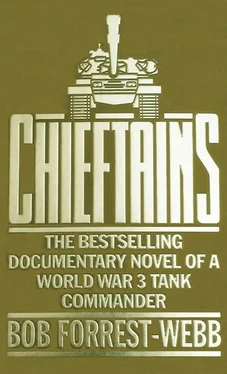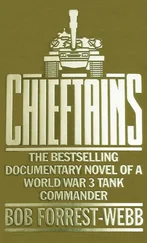On the situation maps of the NORTHAG battlefront, General Sir Alexander Dormer could see clearly the present extent of the Warsaw Pact advance; the maps were continuously being adjusted by his staff, brought up-to-date the moment information became available from the various fronts. The battle computer system had removed much of the guesswork from strategy, though the early loss of many of the NATO reconnaissance satellites had proved very damaging.
At the moment, the Soviet forces had done little more than straighten the old frontiers. In the north, they threatened the city of Lübeck in a push towards Kiel. The largest immediate loss of territory had occurred between Lauenburg and Bergen, where a peninsula of Federal Germany, the Wendland, had been attacked simultaneously from north and south, west of the river Jeetze, and a heavy Soviet air drop at Hitzacker had unexpectedly established a bridgehead. The Elbe at this point was wide, and it had been thought the NATO defences were adequate, but a complete airborne division from the Mongolian Peoples Republic of the USSR had been used in the assault. It had been one of the possible contingencies of modern warfare; the Americans had proved the feasability of flying airborne troops into battle from great distances, and the Soviet command had been quick to see how it could be exploited to overcome problems caused by competent enemy surveillance in battle areas. The sudden involvement of unexpected numbers of men and fighting vehicles could easily disrupt the calculations of planned defence. The loss of the Wendland was Dormer’s only present regret. It had been expected, but he had hoped the river Jeetze, which cut south across the whole peninsula of land and then east towards the border, would have proved more of an obstacle to the Soviet advance, and further increased their heavy casualty figures.
It had long been admitted it was impractical to consider establishing a main line of defence at the Eastern German border. With an increasingly mobile type of warfare, and against the great strength of the Warsaw Pact countries, a did wall technique would tend to produce near matching losses for both attackers and defenders. By using more flexible techniques, reserves could be held in readinass until the inertia was lost from the Soviet invasion, their shock troops no longer effective, and their supply lines stretched. At such a time, the Warsaw Pact armies would be at their most vulnerable, and the NATO powers at their strongest.
Dormer read the decoded message just received from SACEUR — Supreme Allied Commander Europe. ‘Reference use of chemicals in various sectors, retaliatory action is in order.’
The message had been carefully worded to ensure the final decision rested with him… not only the decision, but the responsibility! Reports of chemicals had reached headquarters on several occasions throughout the day, but there appeared to have been no concentrated attacks. And in no instances had the use of chemicals been sustained. It had been difficult for him to decide whether it had been deliberately used but in limited and almost experimental circumstances, or released by pure accident; perhaps the destruction of a vehicle equipped with chemical weapons.
The communications deer knew the contents of the message and was waiting for Dormer’s reaction. ‘Do you want me to pass it to divisional levels, sir?’
‘No, not yet.’ Not until I’m damned certain, he told himself. It was all too easy to begin an irreversible escalation towards the use of nuclear weapons.
Studley had been blindfolded, he thought unnecessarily, and then made to lie spreadeagled face downwards on the ground. His feelings were too mixed to be identifiable: dismay, humiliation, disappointment, bitterness. He had never before understood suicides — except as a form of patriotism where death was used as a shield to protect colleagues — he considered it now. If he were to leap to his feet, attempt to run, then his guards would shoot. But it might not be death, simply more pain; a useless gesture. Lt Colonel James Studley felt helpless. After years of exercising authority, it was not easy for him to accept degradation.
The helicopter swung down above the trees, the gale of its rotors stripping the remaining leaves from the thin twisted branches, ruffling Studley’s clothing and hair. He was pulled to his feet and almost thrown into the aircraft. There was a guard close to him, the man announcing his presence by pressing the cold muzzle of a rifle against Studley’s neck. The feeling of lift was brief before the machine levelled out above the trees and swung across the plain. The flight lasted less than ten minutes.
His blindfold was removed when he had been half-dragged some fifty meters from the helicopter. Its engine roared; he felt the wind of its take-off and heard it slip into the distance. He was inside a rough canvas tent, its square shape disguised by camouflage netting. Three radio operators were sitting beside their equipment, one speaking rapidly in Russian. A number of officers were bent over maps on a long wooden table in the centre of the tent, and clerks and infantrymen were busy around them. They ignored him for sever & minutes; the guard, a thick-set man in brown combat clothing, rigidly at attention by his side.
Eventually, one of the officers straightened himself, stared at James Studley and walked towards him. The guard saluted and handed over a mall cloth-wrapped bundle. The officer tipped its contents on to a narrow desk, and Studley recognized his own belongings and identity papers. The officer examined them for a long time in silence, referring frequently to notes on a clipboard beside him.
Studley knew the man’s uniform, dark green with gold and olive epaulets; a captain of the Soviet Army Main Intelligence Directorate, the GRU.
‘You are a lieutenant colonel in the 4th Armoured Division of the 1st British Corps,’ said the captain. His English was good, too good to have been learnt only in the USSR. The man must have had embassy experience.
‘I am Lieutenant Colonel James Studley, and my number is 457590…’
The captain interrupted him. ‘Colonel, you have been watching too many war movies. I know what you consider to be your rights. I am also aware of your name, rank and military identification number. I know also you are commanding officer of a battle group which you have named Cowdray, and that your group consisted of part of the Kings Hussars, a company of mechanized infantry, self-propelled guns and missile launchers. I say consisted, Colonel, because regretfully it no longer exists. It has been wiped out.’ He paused to allow Studley to digest his words. ‘We have also destroyed your field headquarters.’
Studley said, ‘I would like to join my officers.’
‘I doubt if that is the truth, Colonel. There were no survivors.’
So Max must be dead after all, thought Studley. It seemed impossible.
The captain continued. ‘Colonel, like yourself I am a professional soldier. You and I do not make wars, we only fight them at the command of our politicians. We realize you were under orders, and naturally you obeyed them; that is good… it is how a soldier should behave.’
Studley felt himself swaying, his vision was blurring.
‘Colonel you must excuse me… of course, you have been injured; it is always a shock to the nervous system.’ The captain shouted in Russian and a chair was placed at Studley’s side. ‘Please sit down. I will make sure you have medical attention as soon as possible. And now…’ The captain picked up the clipboard from the table. ‘Colonel James Studley, born in Hastings Cottage Hospital, Sussex, 16 June, 1941. Mother, Margaret Elizabeth Studley. Father, James Howard Studley, veterinary surgeon, formerly a captain in the British Army Veterinary Corps and awarded the Military Cross in action in Italy, in 1944. Quite unusual for a veterinary officer, Colonel! You were educated at Winchester, and then accepted in to the British my in August 1959… I have quite a lot here on your military career. Very successful, Colonel…’
Читать дальше












